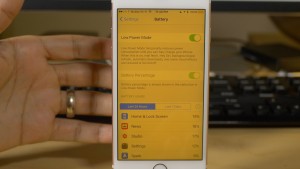Article

Your iPhone or iPad will have security and software-quality updates delivered separately from the main functionality upgrades
Apple Could Soon Split iOS Updates And Security Updates | Ubergizmo
My Comments
A trend that is increasing in relationship to software maintenance and quality assurance is to assure the ubiquitous availability of critical security, software-quality and compliance updates for a device or program. This is through delivering such updates under separate cover from major updates that primarily add features and functionality.
You may think of these critical updates as just security patches for the device or program but these can include general bugfixes, software refinements to to have the program run more efficiently or compliance modifications such as to update daylight-saving-time rules for a particular jurisdiction.
Microsoft, Google and Apple headed that way with Windows 10, Android and with MacOS respectively. This approach benefits the software developer and the user equally because the security, software-quality or compliance patches are usually small files. The software developer can assure guaranteed delivery and installation even with older devices that aren’t able to take newer versions of the software thus hardening the device’s platform against security exploits.
Similarly the user can choose not to install a functionality update if they don’t see fit or may find that it offers a steep learning curve due to significant user-experience changes. It is more so where a user would rather run with a highly-stable version of the operating system than the latest “rushed-out” version that carries bugs.
Apple will be taking this approach with iOS soon. Previously, the iOS mobile operating system was maintained using the delivery of major versions offering major functionality. But Apple would deliver iOS bugfixes and security patches as a minor or “point” version dependent on a major version, something that was considered orthodox in the world of software maintenance and quality assurance.
But if they were to “reach” older iOS versions with a security or compliance update, they would need to offer a minor or “point” version for a prior major version as a separate software package. This is an issue that affects people who maintain older iOS devices, especially iPads or iPod Touch devices that are less likely to take newer major versions of iOS.
Through the development of iOS 14.5, Apple has looked in to the idea of “splitting” the critical updates from the main software package so that these can be delivered under separate cover. This could also allow Apple to package one of these updates to touch multiple major versions of the operating systems.
It could also be a chance for Apple to see a long service life out of iOS devices especially where older devices may not run the latest major version of iOS. This would be very applicable to iPad and iPod Touch users who see long-term use out of those devices or families who pass down older iPhones to their children. It could also be a chance for Apple to keep multiple hardened codebases for iOS going but able to support different device abilities.
It will also encourage Apple to deliver frequent software patches to iOS users especially if they can be installed without restarting the device. This is more so if Apple wants to create a tighter software-quality-assurance regime for their platforms.
But Apple also has to provide separate critical-update delivery to their tvOS operating system which drives their recent Apple TV devices and their watchOS operating system that drives their Apple Watch products. It can then be about creating a robust software quality-assurance approach across all of their products but catering to people who maintain older products.


